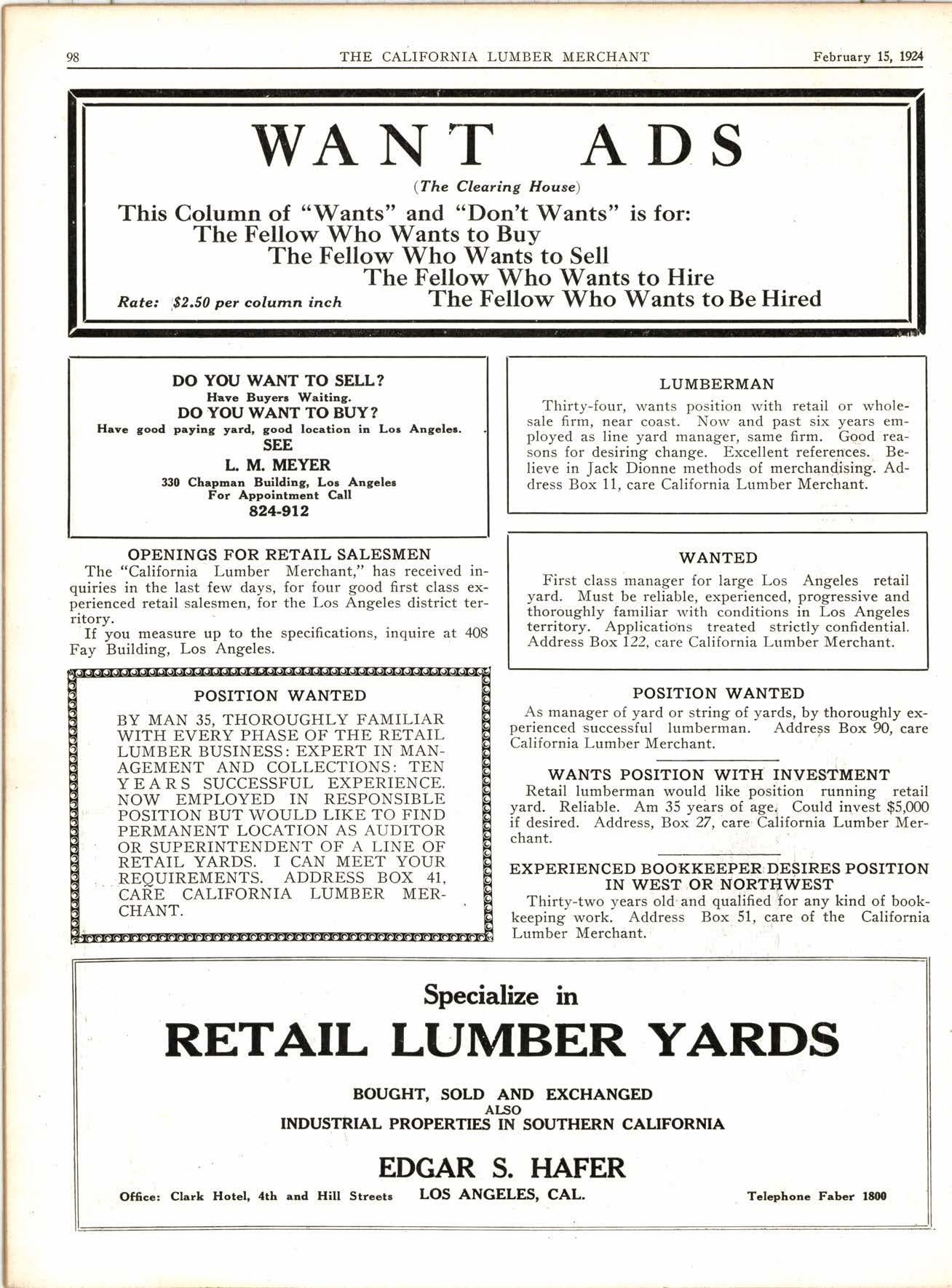
3 minute read
Personal Efficiency in Yard Managers
The retail yard managers of the country generally, and the line yard concerns as well, are both awakening to a realizatioh of the great and important part that the personal efficiency of the manager plays in the success or failure of a retail lumber business.
We all remember the day-without stretching far backward into the past-when a great many line yard firms were inclined. to consider their local manager little more than an automaton, and about the only assets that many of them demanded'in the selecting of yard managers, was experience in the handling of lumber, the keeping of lumber accounts, and personal honesty.
This condition was due to the fact that the lumber industry had not awakened to the fact that merchandising played any part in its operations. The line yard owner who hired a yarcl manager, did not stop to consider whether or not the applicant was capable of CREATING or PRODUCING business beyond that which came to his door seeking bids on bills of material already prepared. He did not seek to discover whether the applicant was the sort of man who would get out and make himself a personal asset to the citizenship of the town, to the end that the building trade might prosper.
About as far as he would go in this direction would be to examine the feliow to discover whether or not he knew how to meet his local competition, how to work with the contractors, and other little mechanical tricks of the trade that were then considered of the utmost importance.
Today, we see, not the dawn, but the early morning of a new day. There has grown alike upon the consciousness of the man who hires yard managers, and of the average yard managers themselves, the conviction that there is something lacking in the old timey idea of a yard manager.
It is amazing to see the change that has come about in the qualificatiohs of the prospective local manager. Surely, they are reversing their thinking. The employers, perceiving the large returns that come from injecting real merchandising methods into their affairs at each local yard, is looking for men whose perspective is broad enough to perceive those same things, and apply the necessities.
The employe, witnessing the trend of things, and at the same time deriving enjoyment of a scope of business action unknown in the old days, is trying to equip himself for the handling of building affairs in a new way.
And the big thought behind all this, is the now accepted but formerly unknown fact, that THERE IS NO LAW OF PREDESTINATION LIMITING THE AMOUNT OF BUILDING BUSINESS THAT MAY BE DONE AT ANY PARTICULAR PLACE DURING THE FUTURE; THAT THE ONLY LIMITATION DEPENDS ON THE EFFORTS OF THE MATERIAL MEN.
Someone has said: "THE BUSINESS OF THE MODERN RETAIL LUMBERMAN IS TO TRY AND MAKE PEOPLE EAT LESS AND WEAR LESS IN ORDER THAT THEY MAY BUILD MORE."
This is putting'it rather broadly, but is covering the ground rather well. In other words, the retail yard manager of the future has a definite aim, a new intent, that has been injected into the fibre of his business. He has more to do than fight for a share of the busihess that Providence brings to his door. The time has come when he is called upon to do CONSTRUCTIVE work, that requlres his brains, energy, ingenuity. He has a POSITION rather than a JOB; a place where he can show RESULTS other than simply keeping a clean yard, clean books, and good collections.
The owner_finds that this sort of merchandising and this sort of man, pays him better. The employe finds that it makes it possible for HIM to increase his earnings, by sharing in the increased business that he can CREATE, broadens his perspective, makes a MERCHANT rather than a clerk, of the yard manager's position.
Personal efficiency frbm this time oh, is the greatest aim of the yard manager. HE will have much to do with developing the "wagon yard" of the past, into the modern retail 'lumber store of the future.
It is a grand change for both employer and employed. It is a broadening of the industry they both play their respective parts in. It is good for the world at large, because the raising of the level of efficiency of any particular industry, raises the level of the industry of the world.









